1. Match. Write the words in the box next to the pictures
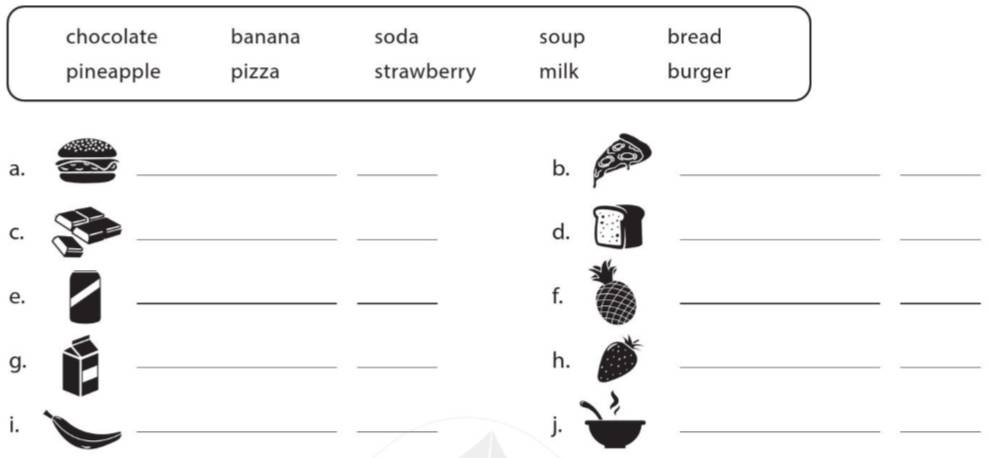
1. Match. Write the words in the box next to the pictures
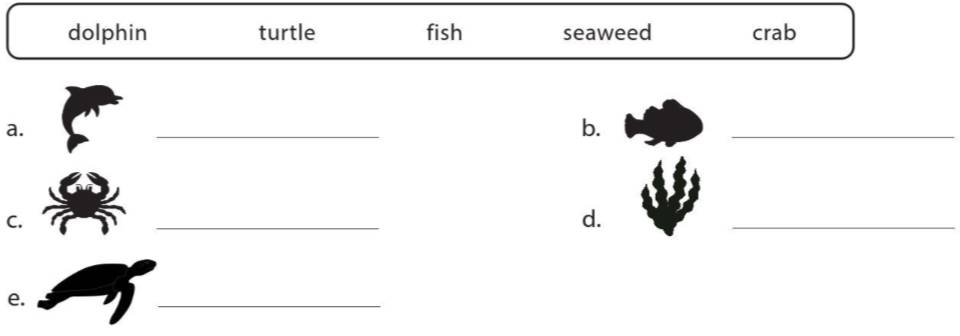
a. Dolphin
b. Fish
c. Crab
d. Seaweed
e. Turtle
1. Match. Write the words in the box next to the picture.

a. soccer b. cricket c. tennis
d. basketball e. rugby f. baseball
Match. Write the words in the box next to the picture.
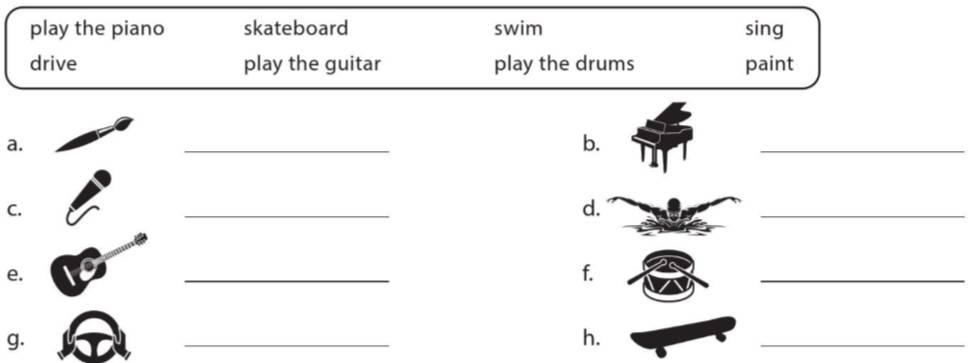
a. paint | e. play the guitar |
b. play the piano | f. play the drum |
c. sing | g. drive |
d. swim | h. Skateboard |
Match the words/phrases in the box with the pictures.
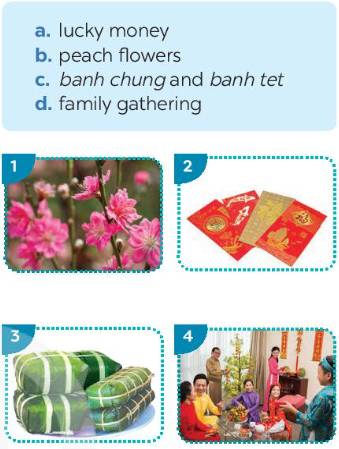
1. Match the words in the box with 1-16 in the pictures. Then listen and check.
(Nối các từ trong khung với số 1-16 trong các bức ảnh. Sau đó nghe và kiểm tra.)
table drawer mobile phone poster laptop speaker desk coat bag chair notebook pen shelf board dictionaries clock |
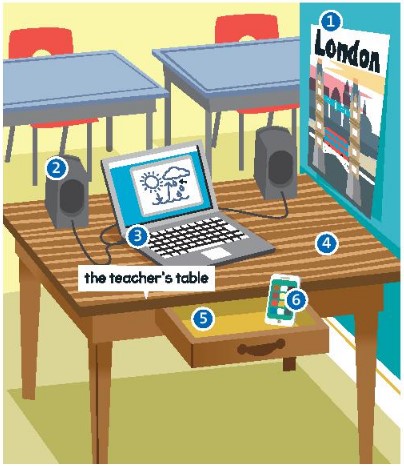
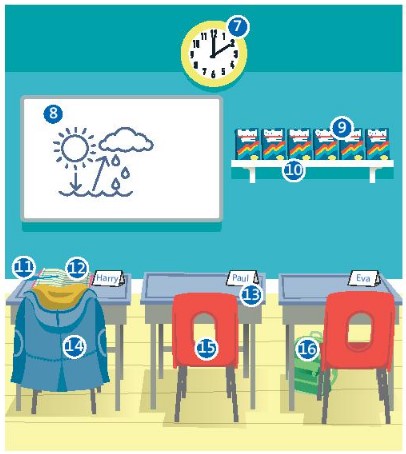
poster - speaker - laptop - table - drawer - mobile phone - clock - board - dictionaries - shelf - pen - notebook - desk - coat - chair - bag
poster
speaker
laptop
table
drawer
mobile phone
clock
board
dictionaries
shelf
pen
notebook
desk
coat
chair
bag
Exercise 1. Check the meanings of the words in the box and match them with pictures 1-9. Then complete the text with the correct words.
(Kiểm tra nghĩa của các từ trong khung và nối chúng với bức tranh 1-9. Sau đó hoàn thành văn bản với các từ đúng.)
feathers scales legs hair wings lungs fins backbones gills |
Vertebrates
Vertebrates are animals with backbones. The following groups are the different types of vertebrates.
Fish
Fish are cold blooded animals and they live in water. They have got scales and (1)………… . They haven't got lungs. They have got (2)………… instead.
Mammals
All mammals are warm-blooded and they feed their babies milk. Most mammals live on land, for example, humans and dogs. However, some mammals, like whales, live in water, but they haven't got gills. Mammals have all got (3)………… .
Birds
Birds live on land, but some of them look for food in the water. They have got (4)………… , two legs
and two (5)………… . Some birds, like ostriches and kiwis, can't fly. All birds lay eggs.
Amphibians
When amphibians are young, they live in water and they haven't got lungs. When they are adult, they have got lungs and four (6)………… - for example, frogs and toads.
Reptiles
Most reptiles live on land. They have got lungs and (7)………… but not gills. They haven't got any wings or feathers and they haven't got any (8)………… . They are cold blooded animals and many of them live in warm places.
1. legs (chân)
2. hair (lông mao)
3. wings (cánh)
4. lungs (phổi)
5. fins (vây)
6. backbones (xương sống)
7. gills (mang)
8. scales (vảy)
9. feathers (lông vũ)
Read the article and look at the pictures. Match the underlined words in the article with pictures 1-4.
A gut feeling?
Emotions do not just occur in your mind; they also have a physical effect on your body. A group of scientists from Finland decided to find out which emotions affect which parts of the body. They asked 701 volunteers to colour in silhouettes in response to emotional words, stories and videos. The results show that the people generally experience emotions like anger, envy and shame in similar ways.
For example, when you're angry, you probably feel that anger mostly in your chest and head. But if you feel ashamed, you probably notice it in your face and, in particular, your cheeks. Depression makes your whole body feel less active, whereas happiness affects your whole body in a positive way.
'Hot' colours like yellow and red show an increase in activity, while blue shows the opposite. Black is neutral.
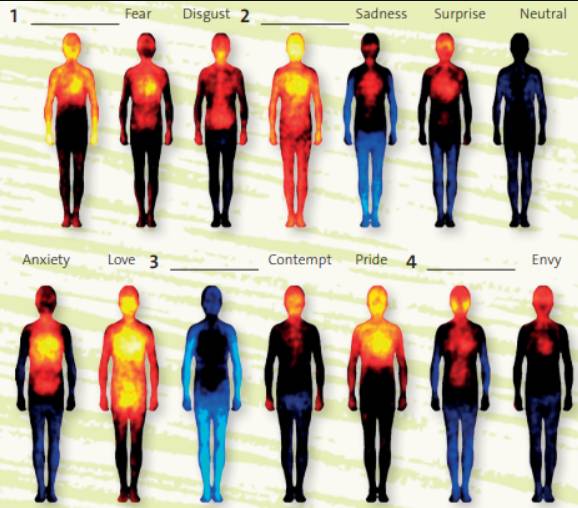
1. anger (tức giận)
2. happiness (vui vẻ)
3. depression (trầm cảm)
4. shame (ngượng)
Rewrite the second sentences so that they are similar to the first sentences.
1.The kitchen is dangerous.Children can't play in it.(Use enough)
=>The kitchen is not
2.No one helped the boy match the words to the pictures.(Use Reflexive Pronoun)
=>The boy
3.Mark stopped running three miles every morning.
=>Mark used
4.Lan intends to make a cake for Mom tonight.(use going to)
=>Lan
1.The kitchen is dangerous.Children can't play in it.(Use enough)
=>The kitchen is not safe enough for children to play in. (Bếp không đủ an toàn cho lũ trẻ chơi ở đó)
2.No one helped the boy match the words to the pictures.(Use Reflexive Pronoun)
=>The boy matched the words to the pictures himself.
3.Mark stopped running three miles every morning.
=>Mark used to run three miles every morning.
(used to do something: từng làm gì)
4.Lan intends to make a cake for Mom tonight.(use going to)
=>Lan is going to make a cake for Mom tonight.
be going to do something = intend to do something: có ý định làm gì
Rewrite the second sentences so that they are similar to the first sentences.
1.The kitchen is dangerous.Children can't play in it.(Use enough)
=>The kitchen is not
2.No one helped the boy match the words to the pictures.(Use Reflexive Pronoun)
=>The boy
3.Mark stopped running three miles every morning.
=>Mark used
4.Lan intends to make a cake for Mom tonight.(use going to)
=>Lan
1.The kitchen is dangerous.Children can't play in it.(Use enough)
=>The kitchen is not safe enough for children to play in.
2.No one helped the boy match the words to the pictures.(Use Reflexive Pronoun)
=>The boy matched the words to the pictures himself.
3.Mark stopped running three miles every morning.
=>Mark used to run three miles every morning.
4.Lan intends to make a cake for Mom tonight.(use going to)
=>Lan is going to make a cake for Mom tonight.